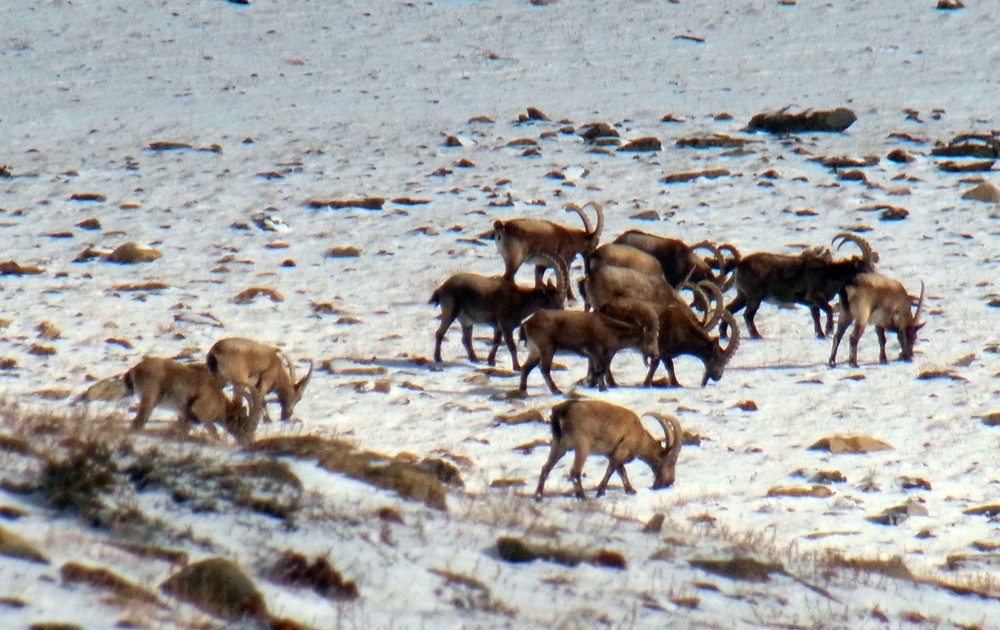
Hunting for ibex in Gilgit Baltistan is a rare experience

They look as startled as I am. Behind me I can still see the Karakoram Highway; I had not expected them so early. Alas, my camera is in my backpack!
By the time I have it handy, the 20 or so ibex are already high up in the mountains.
Some hours later, after crossing a glacier, I see the carcass of a calf with an opening in the side of its body. Though I am sorry for the small thing and its owner, I take this to be a good sign -- it means that snow leopards are still found here. When the king of the wilderness in northern areas of Pakistan has had enough food, he starts to eat à la carte satiating his hunger with only the innards of his victim.
The next morning, I am on the 4,200-metre-high Patundas, with my camera handy this time, scanning the area like a Red Indian. The whole snowy plateau is now visible, and so is a herd of ibex, only a 100 metres away from me. Another herd of ibex follows the first one, in sequence like an army unit towards the edge.
After catching a glimpse of the fifth longest glacier on earth (outside of the Polar Regions), I go home to Borith Lake, where only one guest is ready for his daily swim. The forest department office, built long ago, is still without windows. The glory of the summer months that brings in thousands of guests is over. Most young locals are down south because neither jobs nor proper possibilities to study exist here. They have apricots in Gojal but the juice is coming from Punjab. They have potatoes but the chips are coming from Punjab. They have the cleanest water, but a Swiss company is delivering it from Lahore.
The government and local community allow commercial hunting in the area, saying that the money will go to the community and that the hunters are not doing any damage.
"The reality is that most legal ibex hunters do not have the ability to go in winter to high altitudes or withstand the cold. But the guides want to get their money, so they let them shoot young ibex," says a former illegal hunter, continuing that the illegal ibex hunters have learned this skill from their ancestors. Basically, "this skill has been passed down many generations and has been refined, so these hunters actually go to very high altitudes, and can bear harsh conditions, and patiently wait to fire at the right ‘trophy size’ (right age) ibex. In this way, the illegal hunters in Gojal are actually fully aware of all matters related to animal conservation, and how to care about it, when on a hunt."
"Why are you not hunting illegally anymore?" I want to know next.
"After many years of suffering, the people in Gojal now finally have a chance to earn from tourism. Still though, this happens only in the summer time, so we have to look to attract the tourists even in winters. Hunting for ibex to photograph however would be a great alternative," he responds.
For some reason, my encounter with the ibex and the illegal hunter reminds me of a Swedish person I once travelled with. He had remarked, "Sweden is the country where a bear may cross the bazar."
How great would it be to hear people say, "Oh, north Pakistan - the place where the ibex crosses the bazar!"
Let’s dream a bit of a different reality.
Besides hunters, tourists visit this region in winters to either hunt ibex or to take their pictures. Tourists don’t throw trash around, because every trained local guide gives them a lecture on clean environment before taking them on a trek. In most towns of Gilgit-Baltistan you are greeted with a big placard, saying "Keep your Pakistan clean". Most hotels have a hot shower - run by sun, wind or water energy, owing to a government project that pays 50 per cent of the expenses for private green energy.
Ah, I can already hear some of you saying, "Stop dreaming! Look at the realities. The government is not promoting foreign tourism. The guests from the south will never learn to behave in nature."
But to that I say, "Stop with your Orson Welles-like excuses that all is lost." A few people had a small dream once and a year later there was a swimming competition in the Karakoram. So keep hoping.
If small dreams start coming true, one after the other, then one day the bigger picture can actually change.